As podcasting continues to grow, so does the competition. And as the competition grows, podcasters need to find new ways to earn attention and attract listeners to their shows.
A podcast trailer is one way to do this.
In fact, podcast trailers seem to be having a moment. In the past couple of years, I’ve seen an increase in trailer-themed articles and even trailer-themed podcasts such as The Trailer Park Podcast.
But how useful are podcast trailers, and what makes a good one?
In this article, I cover:
- What a podcast trailer is and why you should have one.
- How following popular podcast trailer creation advice will get you mediocre results.
- What advice actually helps in making an amazing trailer.
- What podcasters can learn from the movie industry.
Do you need a podcast trailer?
Probably.
According to Dan Misener from the podcast growth agency Bumper, podcasts that appear on top charts are more likely to have a trailer.
Misener states in the article, “I pulled a list of ‘Top Shows’ from Apple Podcasts US on Friday, February 3, 2023. Of the top 200 shows I looked at, 108 (or 54%) contained trailer episodes […] this suggests top-performing shows in Apple Podcasts are much more likely to contain trailer episodes than the average show.”
Given correlation isn’t causation, having a trailer or not having a trailer doesn’t guarantee chart-topping placement.
However, having a trailer often shows the podcaster cares.
“But trailers are often a mark of quality. A trailer tells potential new listeners that you respect their time and attention. A trailer tells directories and app-makers that you care about the listener’s experience.”
– Dan Misener, Co-founder of Bumper.

James Cridland of Podnews recently shared some interesting stats about trailers as well. In the Big tech is bad for podcasting update, Cridland reported, “Podnews looked at 362,324 podcasts feeds in our sample over the last three months: just 50,096 of them (14%) have a trailer marked in their feed. Trailers are given special promotion within many podcast apps, and can be an ideal way to help potential listeners understand what your show is about.”
Again, podcast trailers aren’t necessary, but they are an easy way to help listeners decide whether to listen to your show and whether the podcaster cares about it.
How to make a “good” podcast trailer. (😂)
Unfortunately, the bar is pretty low. In preparation for this article, I conducted a Google search for “podcast trailers” and looked at the ‘People also ask’ section to get ideas.
I was disappointed by the results.
The top “People also ask” phrases included:
- podcast trailer examples
- podcast trailer script
- podcast trailer script template
- podcast trailer idea
- podcast trailer generator
- podcast trailer script example
- podcast trailer description
- podcast trailer marker
- podcast trailer length
More people are interested in being told exactly what to do, and/or they want to follow a pre-existing script for their podcast trailer.
I also ran “podcast trailer” through an SEO tool and laughed out loud at the results. About 10x more people are searching for “how to make a good podcast” than what makes for a “great” one.
I know it’s minor, but I still thought it was funny. 😏

5 Best practices for podcast trailers.
I went through the top 10 articles on “podcast trailer best practices,” and most of the advice repeated the same basic suggestions.
But a handful of solid sources do exist. I’ve been producing podcasts since 2012 and these are a few pieces of advice that resonated with me.
1. Use a podcast trailer to set up your podcast feed.
Every podcast likely has an RSS feed. Without getting too techy, this is the URL you submit to distribution platforms like Apple, Spotify, Google Podcasts, etc., to share your show.
However, you must have at least one episode for your podcast feed to exist. Each distribution platform takes a different amount of time to push your feed live from the time you submit it. That means your content might be live on Spotify but not on Apple.
Personally, my team doesn’t like launching a feed with the first episode. Instead, we prefer to establish the RSS feed with a trailer. This gives us time to set up and submit the RSS feed to all the different platforms. It’s totally fine if people find the trailer and listen on their own, and then we can plan out a proper show launch with a planned release date for episode 01.
Furthermore, I don’t like listeners accidentally finding the first full episode without context. Launching an RSS feed with the series’ first episode also makes it difficult to track podcast analytics compared to having a dedicated release date.
2. Feature your trailer on specific podcast platforms.
Certain podcast distribution platforms, like Spotify, allow you to set a trailer for the show. This is an easy way for a browsing listener to find and hear your trailer to see if your show is for them.
If you have a trailer, make sure to indicate it on the different distribution networks.
3. Represent your podcast accurately.
This was the one piece of the “basic suggestions” I mentioned above that I agree with.
Back in high school, I saw a movie trailer for a comedy that portrayed it as a quirky kind of humor. I bought tickets for me and my girlfriend, went to the theater, and within the first 5 minutes of the movie, realized it was actually a crude and raunchy style of humor.
We left and got our money back.
Podcast trailers are the same way. Don’t promise or portray one thing in your trailer and deliver something else in the actual show. That’s a fast way to lose listener trust and loyalty.
4. Don’t be afraid to experiment with your trailer(s).
I was happy to see a few articles encouraging podcasters to consider the type of trailer they are making.
A few types include:
- The Teaser Trailer. Give only a bit of info to pique a listener’s interest.
- The Coming Soon Trailer. It typically launches before a show or season is released to get listeners excited.
- The Promotional Trailer. The standard “this show is about” trailer that most people think of when talking about podcast trailers.
You should test different concepts and styles and see which works best for your show.
5. Be intentional about using “best” practices.
As noted, most of the “best” practice articles were generic, lackluster, and absent of facts. I’ll save you the effort. Nearly all the top search results boiled down to these points:
- Be brief and concise/don’t be too long.
- Include the podcast name, show description (who it’s for and what it’s about), the release date, and call to action (like where to find it).
- Be aware of your tone, who your audience is, and the promises you make about the show.
- And for the love of God, keep it between 30 and 90 seconds (preferably under a minute otherwise the world might explode).
What nearly all of these articles fail to do is give any concrete reasons why we should follow these rules. You need to understand why these practices exist and how they might affect your podcast trailer before you decide to follow them blindly.
When looking deeper, I found that the majority of the articles were written by podcast agencies or podcast course sites. Given my understanding of the SEO game, I feel like they wrote articles to rank, not to actually offer interesting insights.
Unfortunately, that means that everyone reading the top search results for “making a podcast trailer” is getting the same mediocre advice.
It reminds me of the “Rules” chapter from Rick Rubin’s book, The Creative Act: A Way of Being.
Rubin says, “Rules direct us to average behaviors. If we’re aiming to create works that are exceptional, most rules don’t apply[…] The world isn’t waiting for more of the same.” (p. 98 & 100)
“As soon as a convention is established, the most interesting work would likely be the one that doesn’t follow it[…] Embedded in each medium, there are sets of norms that restrain our work before we’re even begun.”
-Rick Rubin, Music Producer, Author of The Creative Act and Legend.
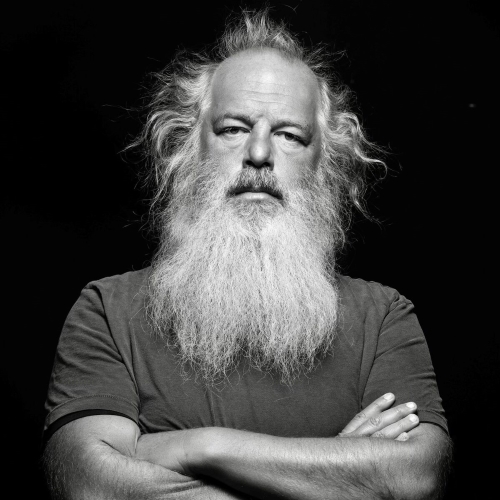
So now what? Most of my research returned the same boring suggestions on how to make a podcast trailer.
It’s time to look elsewhere.
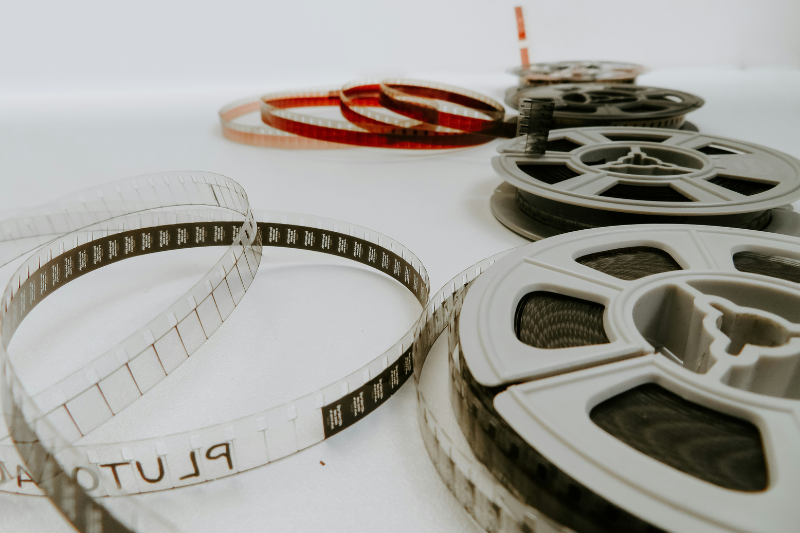
Finding podcast trailer inspiration from the movie industry.
The podcast industry isn’t the only place to find inspiration for your trailer, and my curiosity led me to the movie industry.
The movie industry has more experience than the podcast industry.
Podcasting has been around since the early 2000s, over 20 years. However, the first movie trailer shown in an American film theater was in November 1913 to promote the musical The Pleasure Seekers. This is over 100 years of experience.
And for movies, often more is at stake.
Movie budgets are significantly higher than most podcast budgets, so recouping costs and making a profit is more important to everyone involved.
According to research featured on Science Direct, a movie trailer can account for one-third of opening ticket sales.
The point: More is riding on a movie trailer.
My guess is that directors are not Googling “best practices for a movie trailer” and following the instructions they find (although that information might be worth adding to this article later 😆).
What we can learn from the movie industry.
If you haven’t noticed, I really hate that most podcast trailer articles suggest the shorter the trailer, the better.
Again, why?
How long are movie trailers anyway?
It turns out that the Motion Picture Association (MPA) allows a maximum of 2 minutes and 30 seconds (or 150 seconds). Movie theaters like AMC play 20 minutes of trailers before the actual movie begins.
And apparently, in 2013, the National Association of Theater Owners (NATO) tried to reduce the maximum trailer time to 2 minutes.
Stephen Follows, a film industry analyst, had some interesting research on this, too.
From his analysis of movie trailers released from 2000–2016, the average length of a movie trailer was 1 minute and 54 seconds or 114 seconds, and the shortest was 11 seconds.
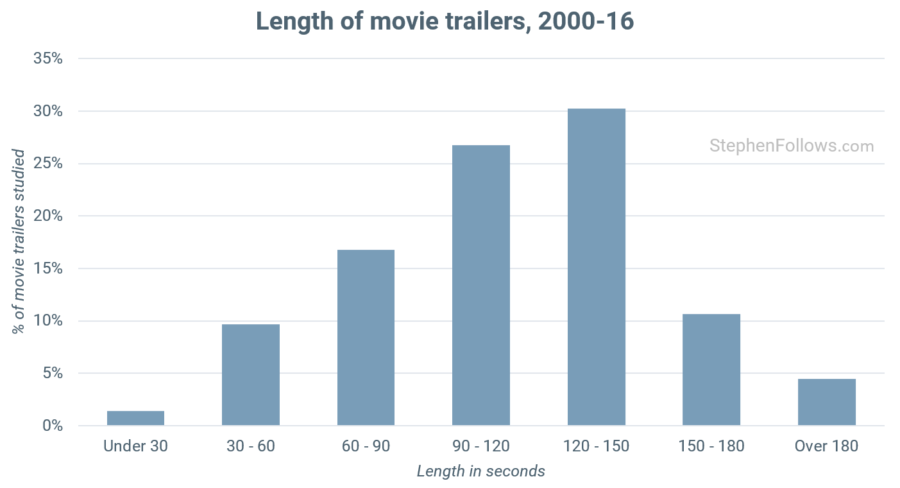
Averages around genre varied, too. For example, sci-fi and mystery genres averaged around 110 seconds in length, with the shortest being horror, clocking in at around 100 seconds.
On the other hand, war, biopic, historical, and sports movies had some of the longest trailers, with averages above 125 seconds. The longest genres were documentaries, at over 130 seconds.
Takeaways about trailer length:
1. Just because it’s short doesn’t mean it’s going to be more engaging.
I was a 7th-grade English teacher before starting Come Alive Creative. Students used to ask me all the time, “Mr. Large, how long does the paper need to be?”
My answer?
“As long as it needs to be.”
Quality isn’t a matter of length. It’s a matter of accomplishing what you need to, in a way that is interesting for the audience.
For example, one article about podcast trailers cited the trailers for Deep Dive with Ali Abdaal and The Mindset Mile by Aisha Zaza as good examples.
Both trailers clock in around 2 minutes in length (gasp!). For both, I was bored at about the 50-second mark. It didn’t have anything to do with the length. I was bored because of what they were presenting and how they were presenting it.
The Wind of Change podcast trailer is 3 minutes and 39 seconds long (another gasp!), and I engaged the entire time.
2. Trailer length depends on context.
As noted, movie trailers had commonalities based on genre. In the same way, a podcast about interviewing famous chefs might need less time than a trailer for a narrative podcast exploring the Cold War.
Also, the style or type of trailer you are making will likely vary in length (for example, a teaser trailer will probably be shorter than a promotional trailer).
Number of months between trailer release and movie release.
Continuing down the Stephen Follows rabbit hole, he also researched the amount of time between the release of a trailer and the movie’s release.
For movies released between 2000 and 2016, the average movie trailer was released 126 days, or 4 months, before the movie’s release date.
The shortest runway is under a month (about 15% of movies), and the longest is over a year before the movie’s release (5% of movies).
This interestingly also varied by genre. Most movie genres stick to around the 100 to 125 days before the movie release mark. Only sci-fi, fantasy, adventure, family, and animation averaged trailers posted closer to 200 days before the movie’s release.
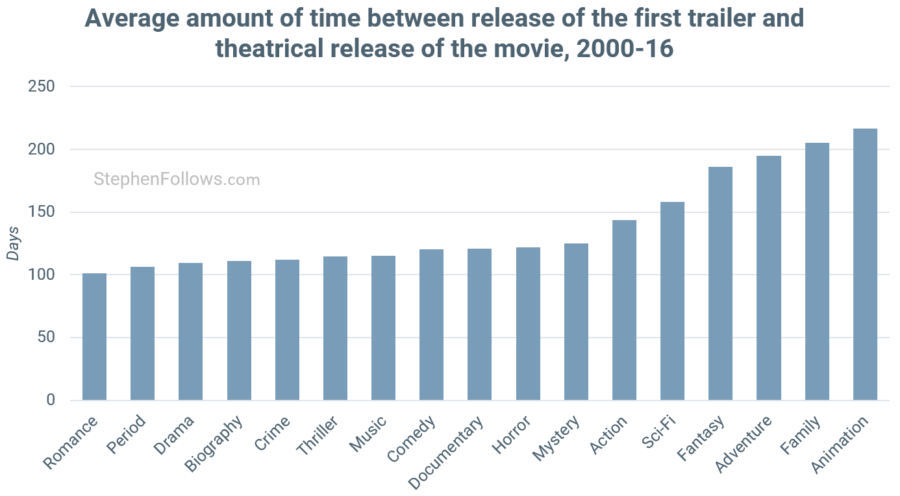
Main takeaway about trailer release time:
Be intentional about when you release your podcast trailer. We typically release the trailer two weeks before the podcast’s official launch.
Our goal is to publish the trailer closer to the launch date so people don’t forget about the show. However, this might not be the best choice for every podcast, and I don’t have data to back this decision.
What are the best movie trailers?
This is a fun one too.
According to IMDB, these are the top 13 movie trailers as of April 2024:
- The Dark Knight
- Braveheart
- Avatar
- The Butler
- The Fighter
- Prisoners
- War Horse
- American Beauty
- Awakenings
- Wyatt Earp
- X-Men: Days of Future Past
- X-Men: First Class
- Man of Steel
While being fun to review and watch, this isn’t very helpful information.
However, it inspired me to review some movie trailers I enjoy and find some commonalities.
With the help of my team, we broke down the flow of several movies in this ugly Google Sheet. The result is a chart that documents the changes in variables for different movie trailers.
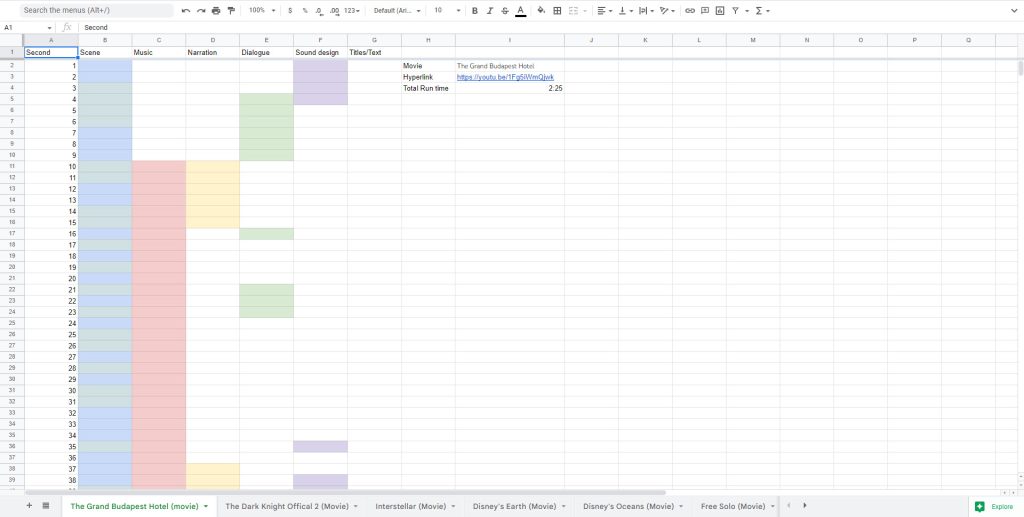
The far left column is the length/timestamp of the trailer. The proceeding columns track the following, using different colors to indicate changes:
- Scenes – How many times the scenes changed.
- Music – When music was used.
- Narration – If/when narration or voices were used.
- Character dialogue – If/when dialogue from the actual movie scenes was used.
- Sound design – If/when sound design was intentionally used to highlight or make a point (more than the natural sounds of a scene).
- Titles/text – If/when text and titles were used to share information in a trailer.
It’s interesting to see the differences between the movies and genres.
The Grand Budapest Hotel Trailer is 2 minutes and 25 seconds long and includes the following:
- 89 scene changes, making the average scene about 1.6 seconds long
- 2 minutes and 04 seconds of background music from 3 different tracks
- 9 seconds of narration
- 1 minute and 14 seconds of dialogue
- 19 seconds of intentional sound design
- And 19 seconds of titles
Compare that to Free Solo’s trailer, clocking in at 2 minutes and 27 seconds:
- 77 scene changes, making the average scene about 3.2 seconds long
- 2 minutes and 20 seconds of background music from 1 track
- 0 seconds of narration
- 2 minutes and 13 seconds of dialogue
- 2 seconds of intentional sound design
- And 31 seconds of titles
Takeaways from great movie trailers:
It’s interesting to see how producers and directors make decisions for each movie and genre: faster cuts vs. slower cuts, music vs. silence, narration vs. dialogue, or both.
While visual elements like titles don’t really apply to audio-only podcast trailers, it still makes you wonder about the decisions you can make to improve your podcast trailer.
How can you leverage music, scene changes, narration, or dialogue to improve your trailer?
And this is just the movie industry. There are other industries that use trailers or commercials to get you interested in their content.
Look around and get inspired.

Biggest takeaway: Learn the rules so you can break them.
After all the research I did about podcast and movie trailers, there was one important lesson:
Forget what everyone else says.
Including me. 😂
No one can give you a definitive formula that will work for you every single time. Marketers frequently say “X” is the best one year and then change it to “Y” the next.
Beyond that, most of the advice you find online is the same boring best practices reused on every blog for SEO purposes. And it’s only going to get worse with the rise of templated and AI-generated content.
Instead, do what you want.
There’s only one piece of advice you should listen to me about if nothing else: Ignore the “best” practices and try the things you think will work.
Do those things, and your podcast trailer will be light-years better than the competition.
P.S.
A quick shout-out to a few people who directly/indirectly helped with this article:
Dan Misener from Bumper for sharing some information on trailers with me before his article went live.
James Cridland from Podnews for pulling some data after I asked him about it.
Stephen Follows from StephenFollows.com. We’ve never spoken, but Stephen, your movie articles came in clutch.
Rick Rubin, producer and author. We have never spoken, either, but I’ve really been enjoying the recent book. It’s been challenging me to refine my own craft.
And Arielle Nissenblatt from The Trailer Park Podcast. It’s the podcast that showcases podcast trailers. Again, if you’re looking for concrete ways to improve your podcast trailer game, give them a listen. I communicated with Arielle a couple of times while researching this article, and after our conversations, she invited me on the show as a guest. You can listen to the interview here.


